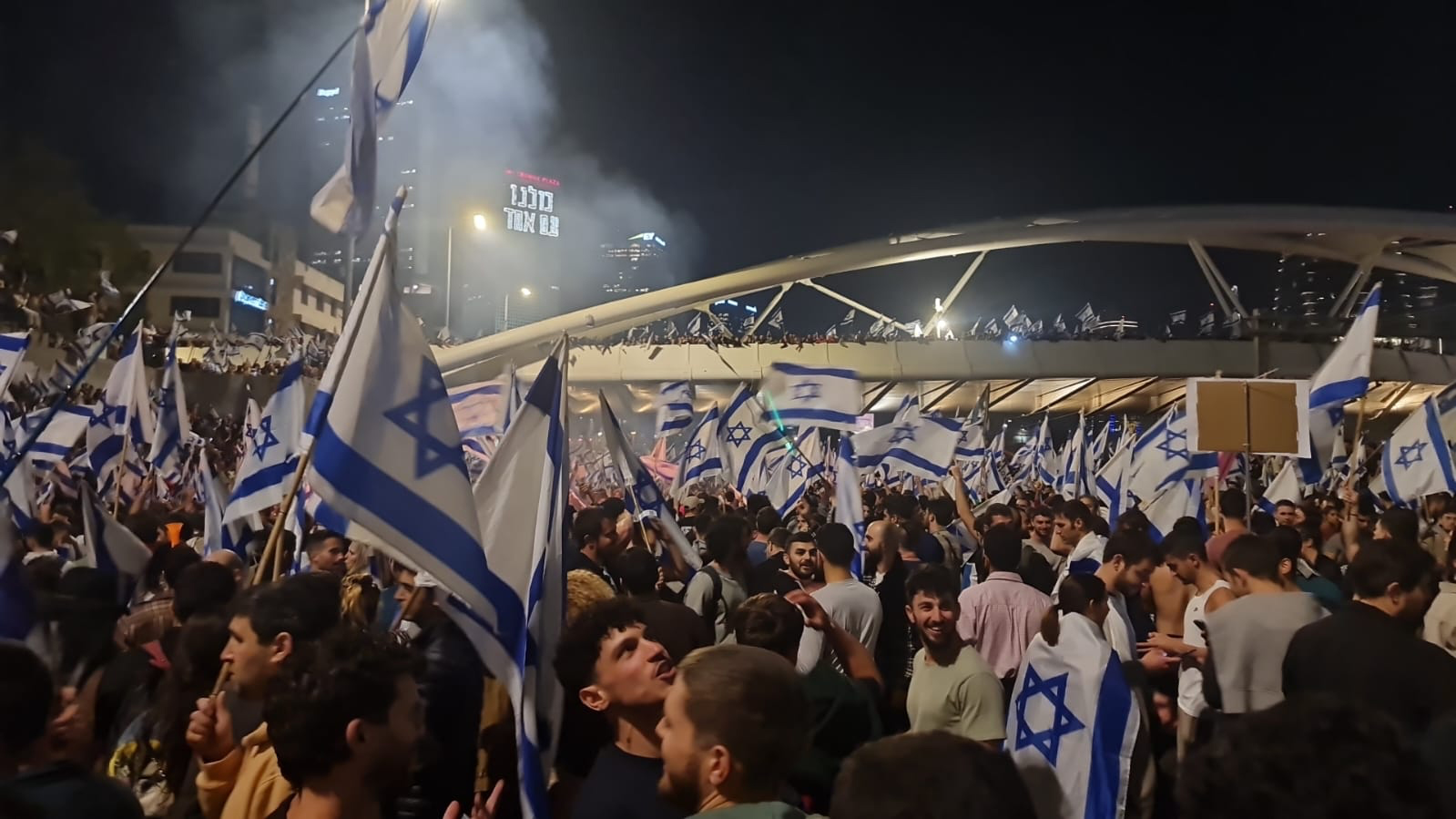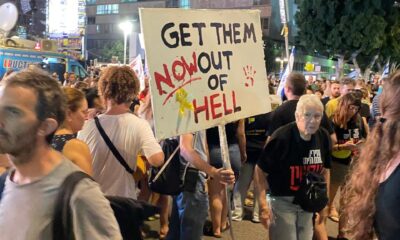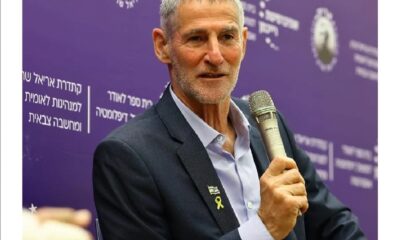
News

Israel’s national crisis averted, or just a lull?
When the daughter of a South African oleh, Galya Sackstein, went to sleep last Sunday night, 26 March, she was worried. “I didn’t know if I would wake up to a country in the morning,” she said.
The country she knows and loves was facing the deepest internal crisis it has ever experienced. And she and hundreds of thousands of Israelis feared for what would happen. Dan Diker, the president of the Jerusalem Center for Public Affairs, says this “earthquake” is “shaking Israel to its core, unprecedented since its establishment”.
Overnight, hundreds of thousands of Israelis joined spontaneous mass protests in response to Israeli Prime Minister Benjamin Netanyahu firing Defence Minister Yoav Gallant. This was after Gallant called on government to pause its planned judicial overhaul. Gallant’s comments were most likely in response to army reservists warning that they wouldn’t serve if the government continued its plan.
The next morning, Sackstein got up and joined a protest. “What’s going on here is crazy. I have never seen anything like it. Everything is shutting down,” she said in a message to her uncle, Howard Sackstein, in South Africa. Labour unions went on strike on 27 March to protest against the judicial reforms, leading to the closure of the airport, ports, malls, banks, and even Israeli embassies around the world.
That evening, 27 March, Bibi announced that he was temporarily delaying the overhaul of the judicial legislation to allow time for dialogue, but stressed that “either way”, reform would be passed. He indicated that this “pause” would last until the beginning of the Knesset’s summer session, which starts on 30 April.
The strike ended, and things returned to normal, but many analysts say this is just the beginning of a fight for Israel’s future, while Israelis feel that their country could still erupt at any moment.
“The most terrifying thing is that there may be a civil war,” says Sackstein. “It feels like Israel is on the edge of a precipice,” says Solly Kaplinski, formerly of Cape Town. “Hopefully now there’s a little bit of light at the end of this dark and twisted tunnel, but our country and our people here and around the world have suffered enormous damage which I hope won’t be irreparable.”
Regarding Bibi’s step back, legal expert Professor Yuval Shany says, “The temporary freeze of legislation is a significant achievement for the protest movement, which was able to show the ruling coalition that its power to govern is limited in spite of the parliamentary majority it enjoys.
“The coalition may use the window of time either to negotiate seriously with the opposition about an agreed upon reform package, or to regroup, hope for protest-fatigue, and then charge again.”
The chief executive of RealityCheck.com, Professor Daniel Pomerantz, says, “The massive protests have sparked renewed interest in potential compromise. A number of moderate members of the coalition are publicly reconsidering their positions which means that the coalition will have to compromise in order to pass legislation.”
Head of legal strategies at Palestinian Media Watch, Maurice Hirsch, is concerned that “the protesters aren’t interested in compromise, they’re interested only in bringing down the government. We have an elected government, elected on a specific platform of very overdue and needed judicial reform, which is now being blocked by people who want to hang onto their last bastions of control even though these are completely opposed to the general will of the people.”
Diker believes that “the demonstrations are about more than the judicial reforms, reflecting a deep-seated fear that religious and hawkish nationalist factions of the coalition will compromise the liberal fabric of society.
“This isn’t the case, as the checks and balances of the political system are built into its structure,” he says. “Ironically, there’s broad consensus among Israelis that judicial reforms are deeply needed, as there is no democracy in which the Supreme Court has such power. Demonstrators constitute only about 3% of the country.”
Professor Glen Segell, research fellow in the department of political studies and governance at the University of the Free State, says that things may quieten down now, but it’s just a reprieve. “Given that we’re moving into Pesach, the two memorial days, and Independence Day, I expect nothing to happen in terms of these laws or inter-party consultations. Other crises and other laws will take over public attention, for example laws about Shabbat and military service. Bibi will unilaterally water down the judicial laws and slip them in at the height of other events.”
In addition, “people feel that Gallant has shown leadership guts. He should take it further, and challenge Bibi for Likud leadership”, says Segell.
South African Zionist Federation Chairperson Rowan Polovin says, “The proposed judicial reforms have generated significant and heated debates and deepened divisions among Israelis and between the diaspora and Israel. This debate has exposed fault lines within Israeli society that have the potential to undermine the country’s social fabric if not addressed in a manner that promotes unity and understanding.
“It’s the division itself, not the reasons for division, that needs our undivided attention,” he says. “There are competing visions of Israel’s future which need to be fused to prevent political schisms in her cultural, business, and defence establishments. It’s key that Israelis strive to bridge these divides. The nation should engage in honest dialogue, in which all perspectives are heard and respected, in order to heal and find a compromise that will strengthen the country’s democratic institutions while addressing the concerns of those who advocate for change.”
Historian and former South African, Professor Gideon Shimoni, has a sober view. “The recent demonstrations were truly unprecedented. What was ominously new was the first ‘anti-protest’ protest launched by Netanyahu [in Jerusalem on 27 March]. The La Familia gang were very prominent and viciously attacked journalists and innocent Arab passers-by as well as anti-government demonstrators.”
“I doubt very much whether the negotiations Netanyahu promised are genuine and can produce a consensual solution. I also think that in the foreseeable future, the massive demonstrations won’t cease unless the governmental coalition implodes.”
But for some, this could be a moment of hope. “Time will tell if this was a watershed moment for Israel, but it certainly feels like it could be,” says former Israeli politician Dr Einat Wilf. “Numerous issues that have been left to fester for decades, even since Israel’s birth, have bubbled to the surface. If managed correctly, this could be a great opportunity to consolidate Israel’s governing ethos and ensure that different groups can maintain a democracy while agreeing to a fundamental vision about Israel’s nature.”
“This seems like the birth of a new liberal political camp in the country,” says Shany. “The atmosphere at the protests is almost revolutionary, and there’s hope that after this show of strength, the political elites will have to re-evaluate their tactics and strategies.”
Says Pomerantz, “the Israeli people are engaged in a historical and patriotic exercise of freedom and democracy. While some Israelis raise valid complaints that Israel’s judicial system needs certain reforms, others raise equally valid arguments that the specific reforms under consideration wouldn’t serve Israel properly.
“The result has been thousands of citizens taking to the streets in freedom and in safety. The chants and speeches are pro-Israel, pro-democracy, highly supportive of the police and the military, and narrowly critical only of certain politicians and specific legal proposals.
“While we don’t yet know what the future holds, one thing is certain, even in this, one of its moments of greatest turmoil, Israel remains a free and peaceful democracy, passionately beloved by its people, and a ‘light unto the nations’.”











Choni Davidowitz
April 2, 2023 at 4:35 pm
I believe this is a “contest” between Torah Judaism and “counterfeit” Judaism.The God of Israel will will be the judge who will “decide” the winner. I know whose side I am on.